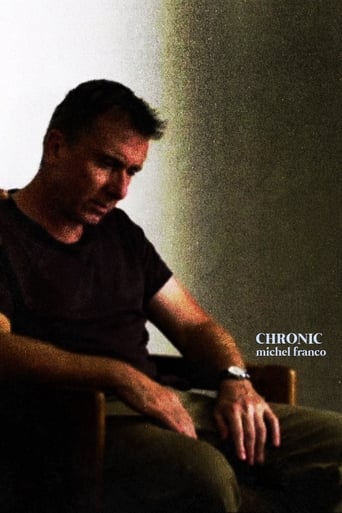

Lack of good storyline.
... View MoreHighly Overrated But Still Good
... View MoreThere's a more than satisfactory amount of boom-boom in the movie's trim running time.
... View MoreThrough painfully honest and emotional moments, the movie becomes irresistibly relatable
... View MoreThis is a very difficult film to watch for those who don't have any acquaintance at all with death and what it's like to lose a loved one to a terminal disease - However, it could prove to be cathartic to such a person and a way to really acquaint yourself with ALL that the people who care long term for our loved ones have to go through themselves while just simply "doing their daily job". David is a person who has lost someone incredibly important to him (his child) on his own and therefore is extremely well-acquainted with what a dying person suffers while going through that process. He thinks and truly considers each patient's perspectives and provides as much as he can possibly can to make them continue to still feel human (which is so incredibly humanistic and kind) -- even going to the point of providing what I can only presume was very "light" pornography for viewing by an adult male dying patient, and joking about how absolutely unwilling he would be to provide a hooker for the same man. Whoever?! said that we don't think about things that brought us pleasure in our healthier days when we are daily inching closer to the end of our time here on the planet? To go so far as to investigate as much as he can the same man's former life work just proves to me how much his patients mean to him. There are very few people who provide this type of care for the dying in the same kind of empathetic manner as David is able to do. Most folks just aren't built that way. They may be very good and efficient at their work, but it takes someone truly special to be able to connect in an the exemplary manner the way Tim Roth's character manages to make look easy. This is a perfect place to say to those out there who may have a loved one going through the true mental pain of leaving this earth to be brave and not forget to touch and care for your soon-to-depart loved one. Put lotion on them. Brush their hair. Show all the physical love that you can because they won't be here much longer for you to give it to them and thus make their transition easier for them and for YOU! Fabulous fare - the only film I can think of wherein a nurse is shown giving precisely the same kind of loving care to his terminal patient was with Jason Robards playing the patient in "Magnolia" with Phillip Seymour-Hoffman playing the nurse. That was honestly one of the best movies I've ever seen!
... View MoreWhat I write could be viewed as a spoiler, so be warned.Yes, this movie has very little action; in fact, it moves at a snail's pace. And yet, the story is a profoundly moving account of the work nurses do for the terminally ill.David is a male nurse who feels deeply for those who struggle with end-of-life issues. Out of his own sense of love, he does what he does, not some deep seated confusion. It is how he has learned to deal with last stage perplexities.How many of us would even venture into that world, for even a week, much less an entire career? Cleaning patients, dealing with their daily needs, and servicing them in whatever capacity they desire is comparable to the Make A Wish foundation.As more and more baby boomers advance in age, these realities will gain greater exposure and discussion regarding what options a terminally ill sufferer has will widen. This is the point of Tim Roth's marvelous portrayal, that, in the end, compassion must reach beyond the norm, to assist in an effort to end suffering.This compares greatly to Mother Teresa's focus on the needs of the dying. Her way, which may be a more godly way, is to be a servant and friend to those at death's door, remain with them until the last breath. Maybe sentiment will one day reach farther watching them slowly die.
... View MoreWhile Mexican director Michel Franco's story about a palliative care worker may not be completely developed, his overarching theme proves to be quite illuminating as well as disturbing. His protagonist is the driven David, very well-played by Tim Roth, known for work in wide variety of independent and mainstream features.Chronic is divided into three segments focusing on the three patients David cares for. The first has little dialogue and focuses on David taking care of an emaciated woman whom we later learn is named Sarah. The camera is fixed at a distance and we see David assiduously attending to Sarah, carrying her around as she is unable to walk and propping her up in the shower, as he bathes her. Soon afterward David is attending the woman's funeral and is approached by the niece of the woman who seeks information as to her aunt's last days. David declines to speak with her. Franco's theme soon becomes apparent—family members keep their distance from relatives chronically ill, facing their last days. Only the palliative care worker—in this case one who appears to care deeply about his patients—seeks to get involved by engaging with the dying, on a deeper emotional level.David so identifies with his patients that when queried by strangers at a bar, he refers to Sarah as his wife, an AIDS patient, who has just died. In the next and most compelling segment, David goes as far as going to a bookstore and purchasing books on architecture in order to converse with his next charge, John, a former architect now debilitated by a devastating stroke. Again, it's the extra effort he puts in to take care of his patients that's so impressive (he voluntarily takes over the night shift for the next nurse on duty free of charge). Unfortunately, John's family doesn't take too kindly to David allowing John to watch pornography on his laptop, and soon he's being accused of sexual harassment and forced to leave John immediately. Again the theme of society's aversion to confronting mortality is reiterated. There is nothing salacious about David's actions—he simply seeks to improve the quality of life for his patients and bring them a measure of humanity and dignity in their dying days.What causes David to be so self-sacrificing? Franco presents David's backstory in dribs and drabs—contact via the computer and in person between his ex-wife and daughter provides a sketchy picture of a man who was forced to deal with the terminal illness of his son—ultimately deciding to pull the plug much to the chagrin of family members. There's not much more to what makes David tick but he's the kind of saint that makes people uncomfortable. Franco's portrait of David's devotion to his patients is uplifting and reminds us that we should all be more sympathetic to those facing end of life issues.In the last segment, David forms a relationship with a woman undergoing chemotherapy and ultimately facing a terminal diagnosis. Again David's engagement of the dying is cathartic, but Franco now shifts gears by injecting another issue into the narrative involving assisted suicide. David's ambivalence about how he handles this situation is brought out and this is how the story basically ends.There is a coda, however, that some critics found specious (Super Spoilers ahead). David, who jogs in his spare time, is suddenly hit by a car and is killed in the final scene. Franco perhaps is hammering us a bit too hard when the devoted healer ironically meets an untimely end himself.Chronic is not for everyone. It's slow-moving and its protagonist is not much of a developed character. Nonetheless, the theme of compassion for the dying and society's aversion to such a subject, is a wake-up call for the majority of us who choose not to reckon with the reality of our own mortality.
... View MoreI went to see this movie because of the Cannes Film Festival best screenplay award that the film had won. It was indeed a good film, with good acting by Tim Roth.The screenplay is good but it has liberally borrowed ideas, without acknowledging it, from Uberto Pasolini's 2013 film,"Still Life," a winner at theVenice film festival. All the director/screenplay writerhas done is that he transformed a bachelor bureaucrat to a divorced male nurse and passed it off as "original" writing. And to think this plagiarism leads to a Cannes top award! Shame on the director! It also brings down the prestige of Cannes' awards. Recently another Cannes Jury conferred the Golden Palm to Haneke's "Amour,"which in turn had copied chunks of sequences/ideas from Runnarson's 2011 Icelandic film "Volcano."Obviously, the Cannes jury had never seen "Still Life." The jury could instead have conferred the best actor award to Tim Roth-who would have deserved it. It underscores the lack of knowledge of current cinema by juries at Cannes in recent years.For those who have not viewed either, please view "Still Life" first.
... View More